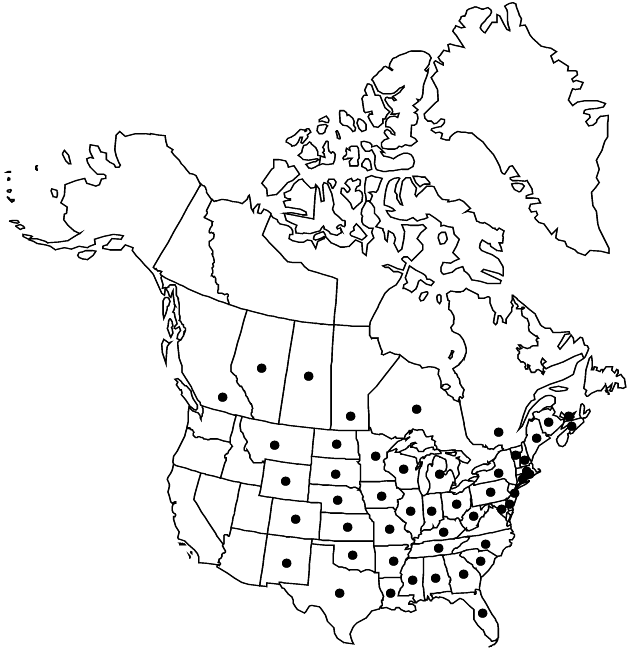Solidago nemoralis
Hort. Kew. 3: 213. 1789.
Plants 20–100 cm; caudices short-branched. Stems 1–6(–10), erect, short-canescent (hairs ascending to appressed). Leaves: basal and proximal cauline tapering to long, winged petioles, blades spatulate-ovate to oblanceolate, 20–95 × 7–15 mm, margins crenate to entire, apices acute, faces densely puberulent; mid and distal cauline (sometimes subtending axillary tufts of lateral branch leaves) sessile, blades linear-oblanceolate, 16–45 × 3–7 mm, reduced distally, margins entire. Heads 10–300, secund, in wandlike pyramidal, paniculiform arrays, secund to apically recurved, 8–25 × 2.5–10 cm, sometimes proximal branches elongate, repeating pattern. Peduncles 2–3.5 mm, bracteoles 0–4, linear. Involucres narrowly campanulate, 2.6–5.8 mm. Phyllaries in 3 series, ovate to linear-lanceolate, unequal, outer acute, inner obtuse. Ray florets 5–11; laminae 2.8–5.5 × 0.3–0.7 mm. Disc florets 3–10; 2.5–4.6 mm, lobes 0.4-0.6 mm. Cypselae (obconic) 0.5–2 mm, strigose; pappi 2–4 mm.
Distribution

North America.
Discussion
Subspecies 2 (2 in the flora).
The arrays can be elongate with ends bent nearly 90–180°.
Selected References
None.
Key
| 1 | Pappus bristles usually not or barely exceeding ray floret corolla tubes and bases of disc floret lobes; disc corolla lobes 0.5–0.9(–1) mm; involucres usually 2.6–4.2 mm (tetraploids have larger heads); cypselae usually only sparsely strigose; basal leaves usually crenate, oblanceolate to obovate; open areas and open woods in eastern deciduous forest | Solidago nemoralis subsp. nemoralis |
| 1 | Pappus bristles usually exceeding ray floret corolla tubes and bases of disc corolla lobes; disc corolla lobes (0.6–)0.8–1.5 mm; involucres usually 4.6–5.8 mm; cypselae moderately strigose; basal leaves usually not crenate, often linear-oblanceolate; prairies (rarely in forested areas) from Indiana westward to the Rocky Mountains, British Columbia to New Mexico | Solidago nemoralis subsp. decemflora |